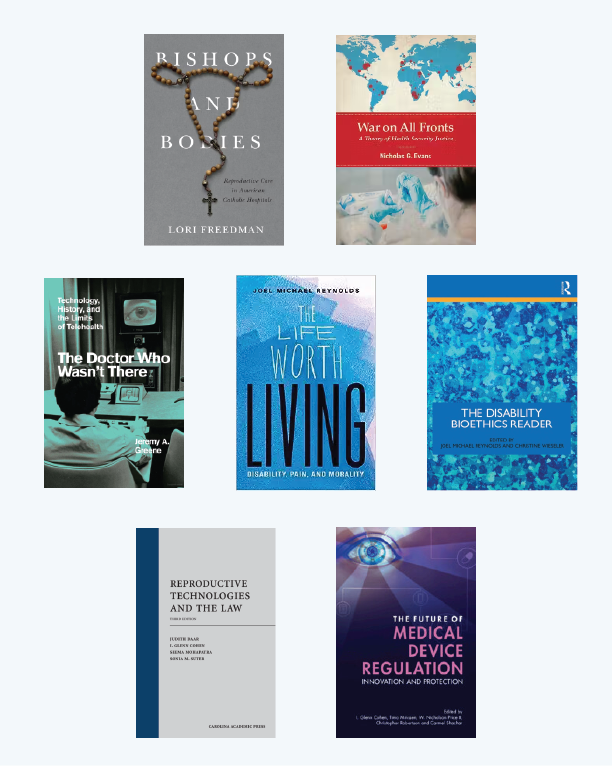The Greenwall community’s diversity of scholarship is reflected in the diversity of avenues through which they communicate their work, from op-eds to social media to peer-reviewed publications and more. For some scholars, the story of their research is best told in full-length books. Just in time for the last weeks of summer reading, we’re highlighting the books that have been published or edited by Greenwall Faculty Scholars and Alums since our first installment of Bioethics Bookshelf in March 2022.
The newest book by from our Faculty Scholars community, Bishops and Bodies: Reproductive Care in American Catholic Hospitals is Alum Lori Freedman, PhD’s exploration of the way that health care decisions are made in the context of Catholic hospitals, where one in six American hospital patients are treated. Prof. Freedman interviewed providers and patients who have spent time in these contexts to investigate how “[t]he Church’s stance on sex, reproduction, and ‘life’ itself manifests in institutions that affect us all.”
Faculty Scholar Nicholas A. Evans, PhD, published War on All
Fronts: A Theory of Health Security Justice with MIT press in May. The
book takes up the ethics issues present in health security—which the WHO
defines as “activities required…to minimize the danger and impact of acute
public health events that endanger people’s health across geographical regions.”
Prof. Evans articulates that the principles that justify decisions in health
security are similar to those that justify war declarations; namely, that they “begin
with the idea that public health should hold human rights sacrosanct and then
ask under what limited conditions other concerns might prevail.”
Earlier this year, the Foundation interviewed Faculty Scholar Alum Jeremy Greene, MD, PhD, about his 2022 book The Doctor Who Wasn’t There: Technology, History, and the Limits of Telehealth. The history of telemedicine—beginning with the telephone in the late 19th century—has been full of promise, and while some of these technologies have improved the practice of health care, others have failed to deliver the health care access or quality for which many have hoped.
In The Life Worth Living: Disability, Pain, and Morality, Faculty Scholar Joel Michael Reynolds, PhD, investigates the ways that disability has become conflated with pain and suffering. Prof. Reynolds draws on millennia of philosophical arguments to explore where that conflation has come from, ultimately making the case that we must expand our sense of what makes a good life, while building systems of access and communities of care to enable flourishing for all bodies.
Prof. Reynolds, alongside colleague Christine Wieseler, PhD, also co-edited the first edition of The Disability Bioethics Reader, published by Routledge in 2022. This 36-chapter publication “is the first introduction to the field of bioethics presented through the lens of critical disability studies and the philosophy of disability,” synthesizing theoretical and philosophical work on disability with empirical work across disciplines to best equip the reader with an understanding of the state of the field in the bioethics of disability.
Finally, Faculty Scholar Alum and Committee Member I. Glenn Cohen, JD, has co-edited two recent books: The Future of Medical Device Regulation: Innovation and Protection, which “provides a multidisciplinary evaluation of the ethical, legal, and regulatory concerns surrounding medical devices in the US and EU,” and the third edition of Reproductive Technologies and the Law.
